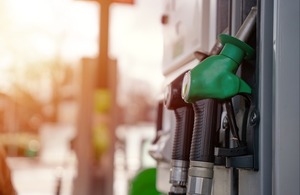Fuel margins ‘remain stuck’ at historic highs, CMA says
Today’s interim monitoring report sets out the Competition and Market Authority’s (CMA) observations on developments in the road fuel retail market since the previous update in November 2024.

Dan Turnbull, Senior Director of Markets at the CMA, said:
While there are several factors contributing to the higher fuel prices seen in recent months, fuel margins remain stuck at high levels which impacts prices paid by drivers at the pump.
The ‘fuel finder’ scheme set to launch this year should be a game changer for drivers – allowing them to find the cheapest fuel prices while boosting competition between fuel retailers.
Fuel prices
Fuel prices increased for both petrol and diesel from October 2024 to February 2025. These movements reflect in part changing crude oil prices and refining spreads, both of which are driven by global factors.
The average petrol and diesel prices at the end of February were 139.6 and 146.8 pence per litre (ppl) respectively. This represents an increase of 5.2 ppl and 7.1 ppl in petrol and diesel prices than the previous four months.
Fuel margins
A retailer’s fuel margin is the difference between what it pays for fuel and sells it at. In this update, the CMA found that fuel margins were similar to the high levels seen during its road fuel market study – a review of the market to understand the factors influencing fuel prices undertaken between 2022 and 2023.
Supermarket fuel margins decreased from 8.6% in September 2024 to 8.2% in November 2024 before peaking at 8.9% in December 2024. Non-supermarket fuel margins decreased from 10.6% in September 2024 to 9.1% in November 2024 before rising to 9.8% in December 2024.
Fuel margins remain high compared to historic levels, which suggests that overall competition in the road fuel retail market remains weak.
Retail spreads
The CMA also looked at the retail spread – the average price that drivers pay at the pump compared to the benchmarked price that retailers buy fuel at – over October 2024 to February 2025.
Petrol retail spreads in the four months to end-February averaged 13.8ppl, which was 1.1ppl lower than over the previous four-month period – but still more than double the average of 6.5ppl over 2015 to 2019. Diesel retail spreads averaged 13.4ppl, which was 2.9ppl lower than the previous four-month period, but still more than the average of 8.6ppl in 2015 to 2019.
While spread analysis can give a quick overview of trends in the sector, it is a less reliable indicator of competitive intensity than individual retailers’ fuel margins. Retail spreads increase and decrease in response to the volatility of wholesale prices but should return to a normal range over time.
Road fuel market study
At the end of its road fuel market study, the CMA recommended a new monitoring function and fuel finder scheme. The previous government accepted those recommendations and determined the CMA would take on the new statutory monitoring function. The new government has since confirmed its commitment to both these measures.
The fuel monitoring function will provide ongoing scrutiny of prices to encourage effective competition between retailers and help keep prices low for drivers. This update is based on data provided voluntarily by fuel retailers – the next update will include data gathered using our new information gathering powers.
The ‘fuel finder’ scheme will allow drivers to compare real-time fuel prices, via navigation apps, in-car devices and comparison websites. The government’s aim is to launch the scheme by the end of this year, subject to legislation and parliamentary time.
Notes to editors
- The CMA has used information requested on a voluntary basis from major fuel retailers, including: Applegreen-Petrogas, Asda, BP, Esso, Euro Garages, Morrisons, Moto Hospitality, Motor Fuel Group, Rontec, Sainsbury’s, Shell, Tesco, and Welcome Break. The next report will use data based on information requests to fuel retailers using the CMA’s new formal powers under the Digital Markets, Competition and Consumers Act 2024.
- All enquiries from journalists should be directed to the CMA press office by email on press@cma.gov.uk or by phone on 020 3738 6460.